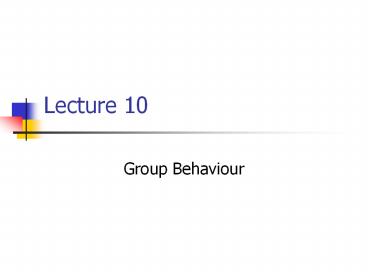Group Behaviour - PowerPoint PPT Presentation
Title: Group Behaviour
1
Lecture 10
- Group Behaviour
2
Outline
- Introduction What is a group?
- Effects of Mere Presence
- Social facilitation
- Social loafing
- Working in Groups
- Leadership
3
What is a Group?
- A group is two or more interacting persons who
share common goals, have a stable relationship,
are somehow interdependent (what happens to one
must affect what happens to the other), and
perceive that they are in fact a part of a group
(Paulus, 1989).
4
Effects of Mere Presence
- Social facilitation
- Any increment of individual activity resulting
from the presence of another individual - Social inhibition
- A decrease in performance in the presence of
others
5
Effects of Mere Presence, cont.
- When we direct our attention to well-learned
tasks, other people usually enhance performance
When we direct our attention to other people, or
if the task is new, other people detract from our
performance.
6
Effects of Mere Presence, cont.
Seconds to Complete Task
Experimental Condition
7
Effects of Mere Presence, cont.
- Drive theory of social facilitation (Zajonc,
1965) - The presence of others leads to uncertainty and
uncertainty leads to arousal - Evaluation apprehension theory of social
facilitation (Cotrell, 1972) - Arousal is due to a learned expectation that the
audience will evaluate your performance - Distraction-conflict theory (Baron, 1986)
- Distractions, such as other individuals, cause
conflict in the performers attention to the task
leading to arousal
8
Effects of Mere Presence, cont.
- Social Loafing
- A decrease in individual effort when people work
in groups as compared to when they work alone. - The tendency for people to do worse on simple
tasks but better on complex tasks when they are
in the presence of others and their individual
performance cannot be evaluated.
9
Types of Tasks
- Divisible versus Unitary Tasks
- For divisible tasks a breakdown into sub-tasks is
possible, but for unitary tasks no breakdown is
possible
10
Types of Unitary Tasks
- Additive tasks
- A task in which all group members perform
basically the same job and the final product is
the sum of all their contributions. - Conjunctive tasks
- A task in which performance depends on how well
the least talented member does. - Disjunctive tasks
- A task in which group performance depends on how
well the most talented member does.
11
Working in Groups
- Problem-solving
- Brainstorming
- Production Blocking
- Decision-making
- Group polarization (risky shift)
12
The stages of groupthink
Poor decisions
ANTECEDENT CONDITIONS
SYMPTOMS OF GROUPTHINK
DEFECTIVE DECISION- MAKING
CONSEQUENCES
Isolated,cohesive Homogeneous Decision-making Grou
p Lack of impartial Leadership High stress
Closed-mindedness Rationalization Squelching of
dissent Mindguards Feelings of righteousness
and invulnerability
Incomplete examination of alternatives Failure to
examine Risks and contingencies Incomplete
search for information
13
Distributive Justice within Groups
- Outcome Justice
- The balance between the contributions made to a
group and the outcomes received in return. - Procedural Justice
- The procedure followed in the allocation of
available rewards - Interpersonal Justice
- Considerateness and courtesy shown to us by the
parties responsible for dividing the available
rewards.
14
Some Suggested Characteristics of Successful
Leaders (Kirkpatrick Lock, 1991)
- Drive
- Honesty and integrity
- Self-confidence
- Cognitive ability
- Creativity
- Flexibility
- Expertise
15
Types of Leaders
- Task-oriented leader
- A leader who is concerned more with getting the
job done than with the feelings of and
relationships between the workers. - Relationship-oriented leader
- A leader who is concerned primarily with the
feelings of and relationships between the workers.
16
Fiedlers Contingency Theory of Leadership (1967,
1978)































